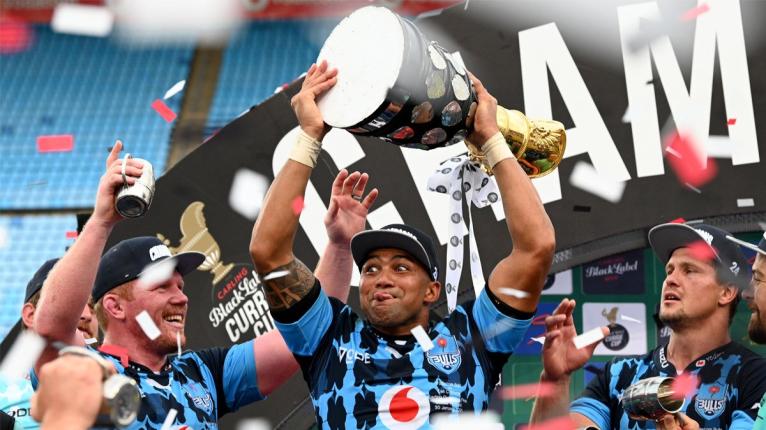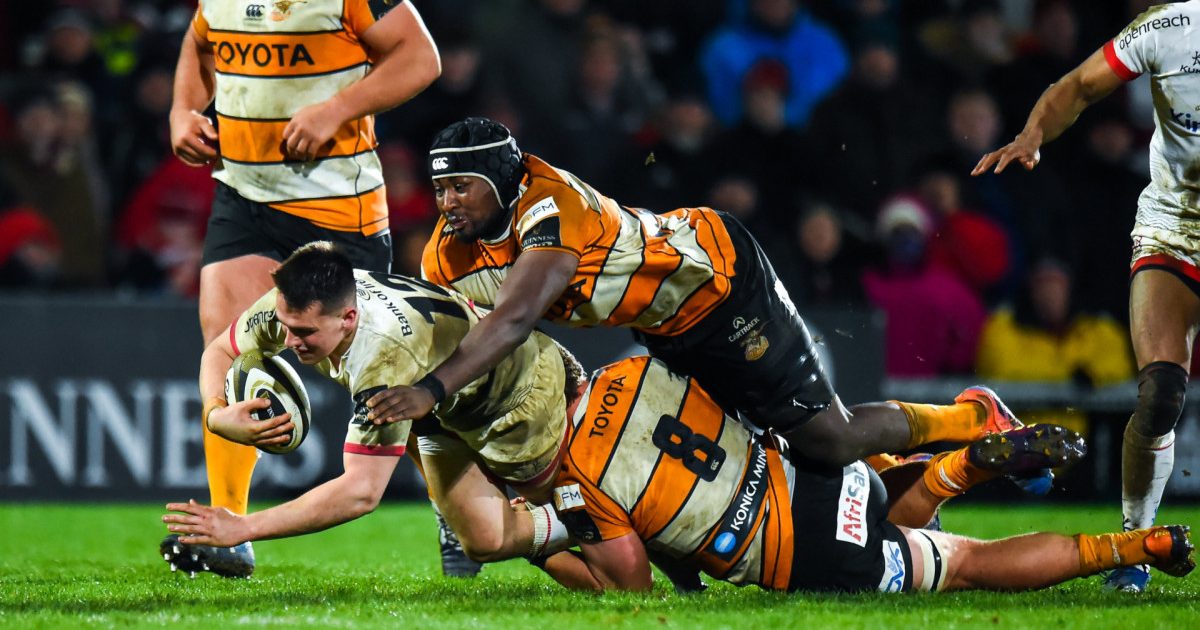'The PRO14 benefited from the Cheetahs... it was a very shocking thing to have to accept'

Miseka Manjezi couldn’t watch the recent Currie Cup final: the lightning threat that brought a halt to proceedings, the nerve-shredding tension of extra-time and the theatre of two South African powerhouses – the Bulls and the Sharks – trading blow for blow. At Loftus Versfeld, her boy, hulking ex-Cheetahs lock Sintu Manjezi, was at the heart of the fervour, the Bulls juggernaut grinding on through the ache of a knee injury suffered early in the contest. The damaged cartilage would later require an operation and a six-month lay-off.
Before every match, Manjezi receives a text message from his mother. In it, she reminds him of how proud she is and how desperately she wants him to seize his dream. Often, the text contains a passage of bible scripture to inspire the giant. The bonkerdom of Loftus – from Chris Smith’s hooked penalty with the clock red, to Arno Botha’s tournament-deciding try in the last throes of extra-time – was too much for her to bear.
“My mum actually said she wasn’t able to watch the final,” Bulls forward Manjezi tells RugbyPass. “It was too nerve-wracking, so she was in the other room and asking my dad, ‘What’s happening now? What’s the score?’ She always mentions I must just go have fun and be calm, and she drops in different scriptures for me to read. She always tells me that she is proud of me, even if sometimes I don’t feel that I have played well. It’s something that I will never take for granted.”
Manjezi’s parents gave up a lot for their son, allocating a large chunk of their income to send him to the prestigious St Andrew’s College, around 80 miles northeast of Port Elizabeth. St Andrew’s charges the third-highest school fees in the country. Its lavishness sits in stark contrast to the obscene poverty that blights swathes of the Eastern Cape.
In progressing from school rugby to the Southern Kings set-up, Manjezi encountered men who came from hideous destitution to reach the very summit of the game. He namechecks Lukhanyo Am and Makazole Mapimpi, World Cup winners in 2019. He talks about the influence of Robbi Kempson, the former Boks prop who stepped in as head coach when the Kings faced financial ruin.
https://twitter.com/sintu_manjezi/status/1355791582398656512
“I speak of Mapimpi because he came from Border when I was at the Kings in 2017, just on a trial,” Manjezi said. “He was one of the only guys who did every day of the pre-season, was never injured or anything. His work ethic from then is something that is very inspirational to me. He is a very impressive man.
“Robbi pushed and supported me coming from high school into the Kings. He saw me play high school rugby and initially I struggled to find my feet in the Eastern Province academy when a lot of other guys were being sent into the Vodacom Cup squad.
“He was telling me what I needed to work on in terms of carrying the ball, calling the lineout calmly. He was pushing me every day to try and improve in little aspects of my game and he was able to support us and find solutions for all the players.
“Yes, it was difficult because we didn’t have everything, but it taught me that you must be able to work with what you have. You might not have the resources or the best pool of players, but you have each other and if you fight for one another, you can go past your limitations of finances and structure.”
In 2017, though, Manjezi realised he was going nowhere fast. He had scarcely played any Super Rugby the previous season. The Kings wanted to keep him as they began life in the PRO14 shorn of many top players, but Manjezi needed a change to prevent his game falling stagnant.
He swapped the coastal bliss of home for Kimberley and the Griquas. He blasted through the Currie Cup with such aplomb that the Cheetahs soon hoisted him up to their squad. Manjezi spent two happy years there, winning his first Currie Cup before, amid the scourge of coronavirus, the Cheetahs were punted out of the Guinness PRO14.
“I came to my first Cheetahs training session and I’d never run so much,” he recalled. “The speed we played at, the ability to catch and pass and step and move as a forward was a major adjustment. The PRO14 benefited from the Cheetahs, the brand of rugby that they played was really exciting even though we struggled touring in Europe, and the kind of players that came through.
“It was a very shocking thing to have to accept. I remember at the time the uncertainty – and uncertainty is not what you want as a player. You don’t want to focus on it, but it gave us something to prove. That is why we were able to win the Currie Cup.
"Suddenly this thing hits you like a lightning bolt… it's so unfair, really, really frustrating. We're very unhappy"
– @CheetahsRugby MD Harold Verster tells @JLyall93 about the fight to save the SA franchise after its @PRO14Official demise ??? https://t.co/oKhLdDyrrH
— RugbyPass (@RugbyPass) October 1, 2020
“People still viewed the Super Rugby as the tournament to be in and PRO14 as a second tournament. It lit a fire under us. I look back on my time there and there weren’t many Boks picked from Cheetahs. It made me want to prove that if we play well in this tournament, we can get opportunities to move to higher levels.”
There have been recent chats with Jacques Nienaber, who succeeded Rassie Erasmus as South Africa’s coach following the joy of Japan. Nienaber wants to see more from the 25-year-old – more carrying and more bludgeoning, more brutality on both sides of the ball – so that he might become the enforcer lock the Springboks always seem to field.
Manjezi is surrounded by role models in Pretoria, from Duane Vermeulen and Arno Botha to Nizaam Carr and Juandre Kruger, and in Bulls boss Jake White he has a coach who can add those elements prized by Nienaber. White has a reputation for rigid structure and a kick-first approach, but he has given his Bulls the licence to play and it has delivered results.
The Bulls won Super Rugby Unlocked as top try-scorers and only the Pumas bagged more in the Currie Cup as the storied old union claimed a double. “He’s been a lot calmer than what I expected,” Manjezi said of White. “When we were down against Western Province, he kept telling us to keep working, that they will break, the dam will burst and everything will fall into place.

“He always focused on not necessarily what the opposition is doing, but how we are not carrying well enough, not executing our lineouts well enough, not defending well enough. In the final he did come in a bit pressured and at the 30-minute mark when we came in for the thunderstorm, he was a bit like, ‘Jeepers, guys, we’re really stuffing ourselves with the way we’re playing’.
“He understands the different styles. He allowed us to play and to have freedom but there was also structure in where and when and how to kick, and what to kick for. It was a very good balance.”
The euphoria has calmed now and, mercifully, so has Miseka. Manjezi underwent knee surgery last month and will miss the Rainbow Cup as the Bulls, Sharks, Lions and Stormers join the PRO14. He hopes to be fit by the time the northern hemisphere season starts again.
“I will have lot of family time, a lot of Netflix, and I play a lot of Madden online so I’ll be trying to improve my record there. Those American kids online can give it to you. I have to switch my headset off. In Madden you can do this showboating, so one time this guy had two long touchdowns and he just kept showboating and tuning me, saying ‘You can’t touch me!’ I ended up quitting the game, actually.”
It was an exception. If the debacle at the Kings, the angst at the Cheetahs and the tumult of the Currie Cup final is anything to go by, quitting isn’t in Manjezi’s nature.
https://twitter.com/sintu_manjezi/status/1275412953676873728

































